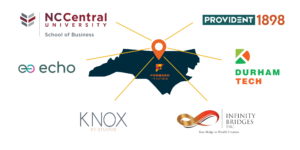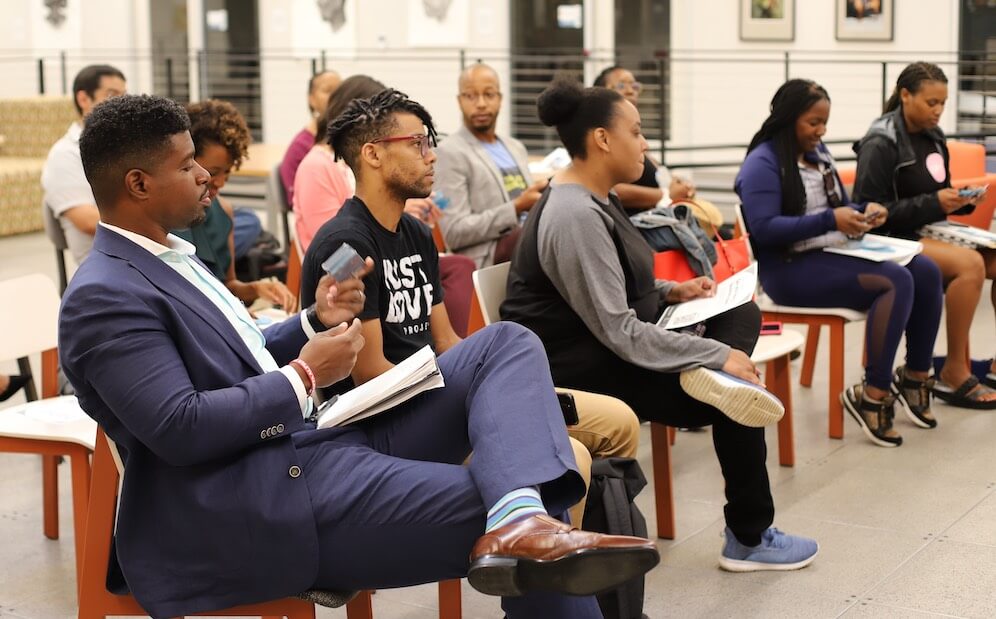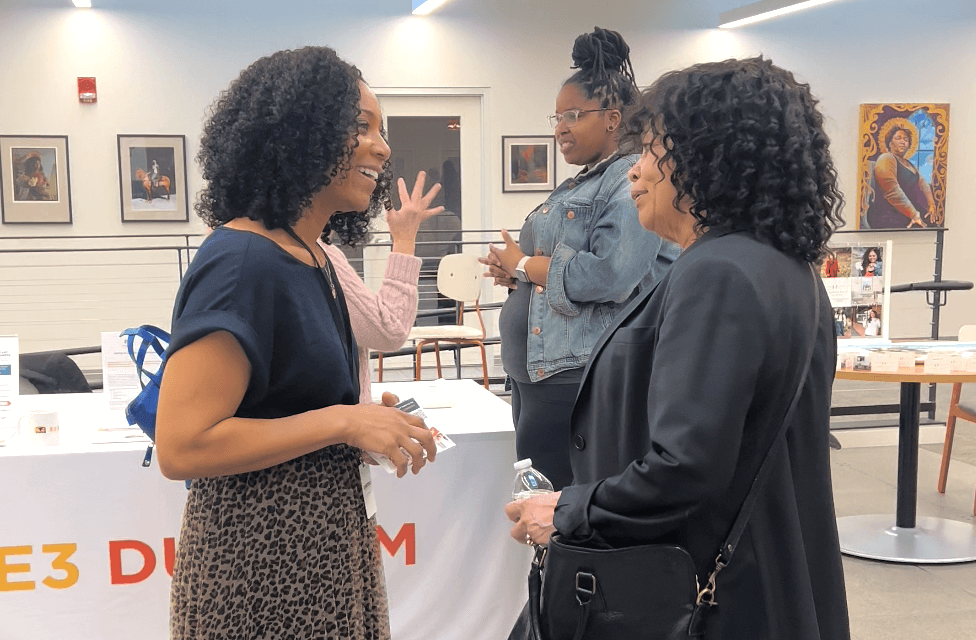In 2021, the U.S. Small Business Administration funded the Equity for Every Entrepreneur (E3) Durham program through the Community Navigator Pilot Program (CNPP). The CNPP uses a hub-spoke model, with one organization acting as the central administrative hub and a collective of entrepreneurial support organizations serving in the role of spokes, accepting referrals for clients who come to E3 Durham looking for assistance. We are very proud of what we accomplished as a collective. As our final impact numbers came in, I was excited to see us crush goals that felt like a long shot two years ago.
Through the collective efforts of our hub-and-spoke consortium, the E3 Durham program:
- Enrolled 430 clients.
- Delivered 2500 1-1 counseling hours, including over 600 hours of navigation and 1900 hours of business counseling & technical assistance.
- Provided 317 hours of workshops and training delivered.
- Supported $272,000 in loans approved.
- Supported $620,000 in grants approved.
Community Collaboration and Wins

The E3 Durham hub-spoke model, with one organization acting as the central administrative hub and a collective of entrepreneurial support organizations serving in the role of spokes.
The E3 Durham spokes served in various capacities as we sought out the most functional and efficient consortium over the program period. North Carolina Central University (NCCU), Durham Tech Small Business Center (DTSBC), Infinity Bridges, and Echo (formerly known as Helius) served as counseling spokes. Knox Street Studios was charged with conducting outreach and participant recruitment. Provident1898 served as the central location for the E3 Durham program and monthly networking activities. The City of Durham and Durham County also supported the program as official partners. The importance of building community was a prominent feature of the program from the start. Provident1898, located in the Tower Mutual, is a cornerstone of Durham’s Historic (and Future) Black Wall Street. The Tower, once the tallest Black-owned building in the U.S., symbolizes Durham's resilience and serves as the backdrop for Provident1898's strong history of entrepreneurship and innovation. Collaborating with Provident 1898’s existing monthly network events, the E3 Durham consortium was able to build on its established reputation as a trusted space in the community and nourish the relationships between business owners, aspiring entrepreneurs, and entrepreneur support organizations.
Some of the key activities that led to the success of the program involved activities that we had not foreseen at the time of the grant. For example, while clients often needed navigation and business counseling to determine the best pathway for their venture, some needed more tangible technical assistance. In the second year of the program, DTSBC engaged specialists to serve clients with the development of their websites, e-commerce, brand development, and legal services.
Another program add-on was a collaboration with the Momentum Financial Academy, funded by the City of Durham and led by one of our spoke partners, Infinity Bridges. After participating in the Academy, small business owners were enrolled in the E3 Durham program to receive follow-on services in the form of 1-1 counseling from Infinity Bridges and get connected to the network of E3 Durham services. During this 1-1 counseling, Infinity Bridges supported clients in accessing ARPA-funded grants from the city.
Through a process we called lateral entry, each of our spokes was able to enroll their clients into the E3 Durham program. Rather than simply suggesting their clients enroll in the program, lateral entry provided a pathway for spokes to enroll their clients and reduce the client's burden of filling out another enrollment form. Allowing clients to enroll in E3 Durham through the navigation services at the hub (Forward Cities) and by direct enrollment by our counseling spokes (NCCU, DTSBC, Infinity Bridges, and Echo), greased the wheels of program participation. Lateral entry accounted for approximately 25% of clients served.

Connecting Entrepreneurs to Resources
As a consortium, getting the referral process right required learning and pivoting to best utilize the strengths of our spoke partners and their service models. Echo was a strong option for early-stage entrepreneurs with its cohort programming, initially in the form of LaunchDurham, an eight-session program. Not long after their merger with Audacity Labs, Echo opted to break the original program into small bites of 2-4 session programs and offer more frequent cohorts. Alongside amping up their cohort programs, Echo added workshops and weekly office hours focused on specific topics to further engage clients and build a sense of community.
Of course, not all early-stage business owners are interested in a cohort program, and many wanted to engage with the 1-1 counseling services provided by NCCU, DTSBC, and Infinity Bridges. Each of the spokes was skilled in all areas of business counseling but had notable strengths in different areas. As counselors worked with clients, they would also refer them to other spoke partners for specific needs. Other clients preferred participating in the monthly networking event hosted at Provident1898 and attending workshops. Helping clients determine what their next steps were and how the program might best work for them was the primary role of the Navigator.
Navigating Power Dynamics & Operational Challenges
As pilot programs go, the E3 Durham program had its challenges. Oftentimes, especially toward the beginning, the role of the hub as the mediator between the SBA and the rest of the consortium placed stress on the consortium team and created a power differential that we did not want to exacerbate. The evolving and moving target of what SBA requested for documentation, including direction on how and when spokes spent their funding and showed receipts was difficult to navigate. Balancing respect for spokes’ autonomy, and the hub’s responsibility to (1) ensure expenditures were allocated as outlined in spokes’ contracts and (2) ensure timely and comprehensive services were available for our consortium's clients was difficult. In retrospect, a democratic approach with collaborative decision-making power of the consortium, especially in terms of funding allocations, was needed. In our best efforts to serve as the hub per SBA requirements, we fell into space that ran contrary to the models of collaborative action that we have worked to stand up in cities across the county. We have learned a great deal from this pilot project - some things we would do again and some things we would not.
Funding Flows & Program Evaluation
Federal regulations and processes presented other barriers to the work we had planned. For example, we were unable to use funds for important aspects of outreach such as advertising and providing childcare during our networking events. If advertising for a government-funded program is largely prohibited in the use of government funds, that reduces the potential impact and reach of the program.
We were also required to remove funding for participant incentives for follow-up data collection. Allowing grantees to use funds to incentivize participant follow-up surveys or interviews is imperative to gathering adequate data to understand the actual impact of the program. When it comes to the main program goal, capital access, we expect the outcome to be significantly undercounted. Data on other SMART metrics defined by the SBA, specifically revenue change and jobs, was also limited due to very high levels of nonresponse on participant follow-up surveys. Evidence for the value of this program could be bolstered with better data.
While evidence for similar models of intervention in different fields (e.g. Community Health Navigators) is strong, the peer-reviewed evidence for business navigator programs is limited. Without a systematic evaluation of the pathways by which the program was proposed to function, we have unfortunately left some extremely valuable data on the table. Important short-term outcomes (i.e., those that were not part of the SBA SMART metrics) such as (1) growth of participants’ social network of business owners with similar lived experiences, (2) increases in business acumen and confidence, and (3) increased social capital through connections to business support providers in the ecosystem (including those who were outside our consortium) were not adequately assessed. Other equally important intermediate outcomes like new business formations, MWBE certifications, and securing contracts were also missed due to the constraints on the use of funding for program evaluation. Bottom line - when testing the value of a pilot program, it is critical to invest in the evaluation needs, especially incentives for participants to report updates on their business activities.

A Path Forward
Unlike almost all of our community engagements in the past six years, the SBA CNPP program did not start with an entrepreneurial ecosystem needs assessment. By diving directly into program delivery under the infrastructure appointed by the SBA, we missed opportunities for ecosystem development and building collaborative relationships across the ecosystem. Through our 360 degree suite of assessment tools, we can gather a better understanding of the current strengths and assets of the Durham ecosystem. Four tools comprise the suite - the Entrepreneur Service Organization Survey, the Economic Inclusion Indicators, a Small Business Owner Survey, and the E3 Scorecard. Stepping back to conduct an ecosystem needs assessment would provide us with a strong foundation for the next iteration of the E3 Durham program. With an understanding of the services provided by more of the ESOs in the ecosystem, the Navigator(s) can be better equipped to think beyond the limitations of a hub-spoke model and consider the best opportunities for ecosystem wide connections.
Through the Entrepreneur Support Organization (ESO) Survey we index services available for small business owners in the community and assess collaboration between these organizations. The results of the ESO Survey allow us to describe what is available in the ecosystem and at what cost to the entrepreneurs, as well as identify gaps in service availability. Using our Economic Inclusion Indicators, we provide ecosystem metrics on business ownership and economic inequities in Durham, NC. This evidence is drawn from multiple population-based data sources (e.g. American Community Survey, Annual Business Survey), shared on a public dashboard, and used as a standardized set of benchmarks for all interested stakeholders. The City of Durham has a Business Owner Survey in progress that we can use to better understand the needs of Durham’s business owners. Lastly, the E3 Scorecard takes local leaders through a structured review of the landscape of opportunities and initiatives supporting equitable access to entrepreneurship in Durham and identifies areas where more effort is needed, areas where they may be an overswell of specific activities, and pinpoint the duplication of efforts.
Consistent with the Forward Cities “Discovery - Design - Deliver” model, sensemaking around the data and strategizing solutions is a collaborative effort that requires the engagement of numerous ecosystem leaders with different perspectives. No one knows everything being planned in the ecosystem on a given day, but collectively - we can begin to close these information gaps, increase awareness and alignment across both service providers and ESO funders, and foster collective action to move the ecosystem forward toward more equitable access to entrepreneurship.
For more information about the Equitable Entrepreneurial Ecosystem in Durham, NC, please contact us.